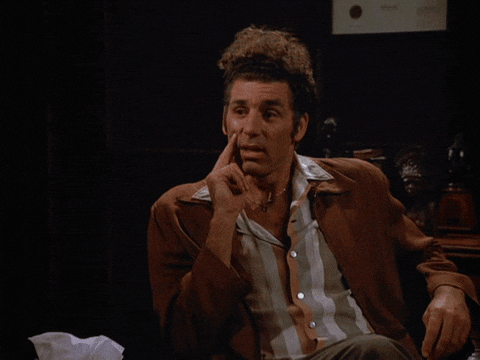The 4 Invisible Rules of Perfectionism That Keep Us Stuck (Part 1 of 2)
Which ones resonate most with you?
Welcome everyone! I am jazzed to see new faces here since last week’s publication of How to Be Enough. Whoever sent you—The Happiness Lab, Good Life Project, CNN’s Chasing Life, HBR IdeaCast, or another esteemed show—welcome!
And if you’re an OG, welcome back! Either way, I’m so glad you’re here.
I shared a post with this theme two years ago, but the message feels even more appropriate today, so let’s expand and go deeper. Today we’ll explore the four invisible rules that keep us stuck.
This week, I met on Zoom with my author support group. We round-robined our needs, and when it was my turn, I asked the group, “Now that the book is out, what should I do next?” The answers rolled in: write another book, try public speaking, make a video course, start a company.
Afterwards, I realized that my very question, “What should I do next?” implied there was a correct answer. My brain was looking for a rule to follow.
If you have some perfectionism, looking for rules might sound familiar. Indeed, following rules is comforting. Plus, when we do things correctly, it feels good: we, by extension, are also correct.
But that means that the perfectionistic brain tries to follow a lot of rules. Indeed, we each have a custom-made rulebook deep inside our brains, written by own personal experiences, as well as our parents, teachers, mentors, and capital-S “Society.”
Some of the rules are big: Anything worth doing is worth doing well. Family always comes first. If you want something done right, you have to do it yourself.
Some are small: You should bag your frozen groceries separately so they can go right in the freezer when you get home. You have to have a separate cutting board for meat. Don’t mix LEGOs and Bristle Blocks.
Assuming the rule is working for you in your current situation (more on this in the next newsletter) all is well.
But let’s look at four rules that 1) are common to the perfectionistic brain, and 2) tend to cost us more than they buy us.
Endure everything
Understand everything
Like (and be liked by) everybody
Always be productive
I didn’t make these up. They’re from Dr. Karen Horney (say “Hor-nigh”), an influential German psychologist who dared to question Freud’s theories to his face. She was decades ahead of her time when she described perfectionism as “the tyranny of the shoulds.”
Let’s take a closer look at how these can manifest:
Endure everything.
A client we’ll call Sidra is in her 20s and lives with two housemates. A couple of weeks ago, Sidra had Covid and confined herself to her room. Her housemates asked through the closed door, “Can we get you anything?” “How can we help?”
Sidra always said no, she was fine, but then spent way beyond her budget on takeout and grocery delivery. Her housemates would try again, saying, “Seriously, we can go get stuff for you.” But Sidra demurred.
For Sidra, “Endure everything” was manifesting as “I can’t accept help.” For Sidra, accepting help would make her an annoying burden. But it inadvertently sent the signal to her housemates that they were useless to her.
“Endure everything” can take many forms: Never feel hurt by others. Take on everything you’re asked to do. Take care of everyone. Be a rock.
Understand everything.
Another client we’ll call Jo was inspired by Instagram to make her own sourdough bread. She followed the directions exactly, but rather than the crusty, fluffy loaf she expected of herself, she got a dense, gummy disc. Rather than call it a rough draft or merely feel bummed, Jo was inordinately annoyed at herself: “Why can’t I do this?”
For Jo, “Understand everything” took the form of, “I should master this on the first try.” Not reaching her expectations was more than just a disappointment; it meant something personal about her and her capabilities.
“Understand everything” often manifests as: Do everything well right from the outset. Struggle means I’m stupid or incapable. Things should come easily to me.
Like everybody.
Let’s turn this one slightly on its head. In social anxiety and perfectionism, the rule manifests more as “Be liked by everybody.” On some level, we think if we just perform well enough—if we can be interesting, or cool, or funny, or at least not come off as awkward or a loser, we can avoid being revealed as inadequate. Our social performance takes precedence over social connection.
“Be liked by everybody” shows up as any social rule: Don’t be weird. Don’t be awkward. I need to be chill and non-problematic. I have to be confident.
Always be productive.
This rule can contaminate our leisure time. We’ll turn a stroll through the woods into a workout, or unwinding with a book before bed into a self-imposed assignment to chip away at the 100 greatest novels of all time. Now, if a heart-pounding hike or a novel-reading project lights you up, go for it! “Always be productive” only crosses the line when we see enjoyment, curiosity, and relaxation as a forbidden waste of time or we think we have to be productive to be sufficient as a person.
“Always be productive” looks like exactly that: Always be learning and improving. No days off. I have to be always working on myself.

Which of Horney’s four rules resonate with you? What rules in your Inner Rulebook are you consciously or unconsciously following?
Next week, we’ll walk through how to challenge the rules that are no longer serving you. Spoiler: you don’t have to do a 180.
If you’re reading How to Be Enough, let me say THANK YOU! 🙏 I hope it’s helpful, makes you chuckle, or both. 💕 If it resonated with you in any way, would you do me a solid and leave an honest review on Amazon?
In the spirit of the book, it doesn’t have to be a long soliloquy. You can leave just stars, or your comment can be one or two words: “Useful!” “Liked it!” (Of course, put whatever you think.)
1️⃣ Just go to the book’s Amazon page,
2️⃣ Click the blue text that says “[#] ratings” next to the stars, and then
3️⃣ Click the “Write a customer review” button.
Thank you and see you next time!
Be kind to others and yourself!









All of those rules resonate with me, actually. Hadn't thought of "liking everybody" as a part of "being liked" and look forward to unpacking that more. And I look forward to reading your book (heard you on Fields's Good Life Project podcast). Thank you for showing me this lens for permission to ease up on myself and others. You're helping me see that life isn't as difficult as I make it. Coincidentally: I'm creating a photo book for one of my brothers for his 60th, and oh my, I can sure see the roots of my behaviors in my body postures in these old photos!
Thanks again; may your ideas reach many people to brighten lives!
Literally me: "a self-imposed assignment to chip away at the 100 greatest novels of all time." I'm trying to stop turning one of my favorite activities into a chore. 🤣